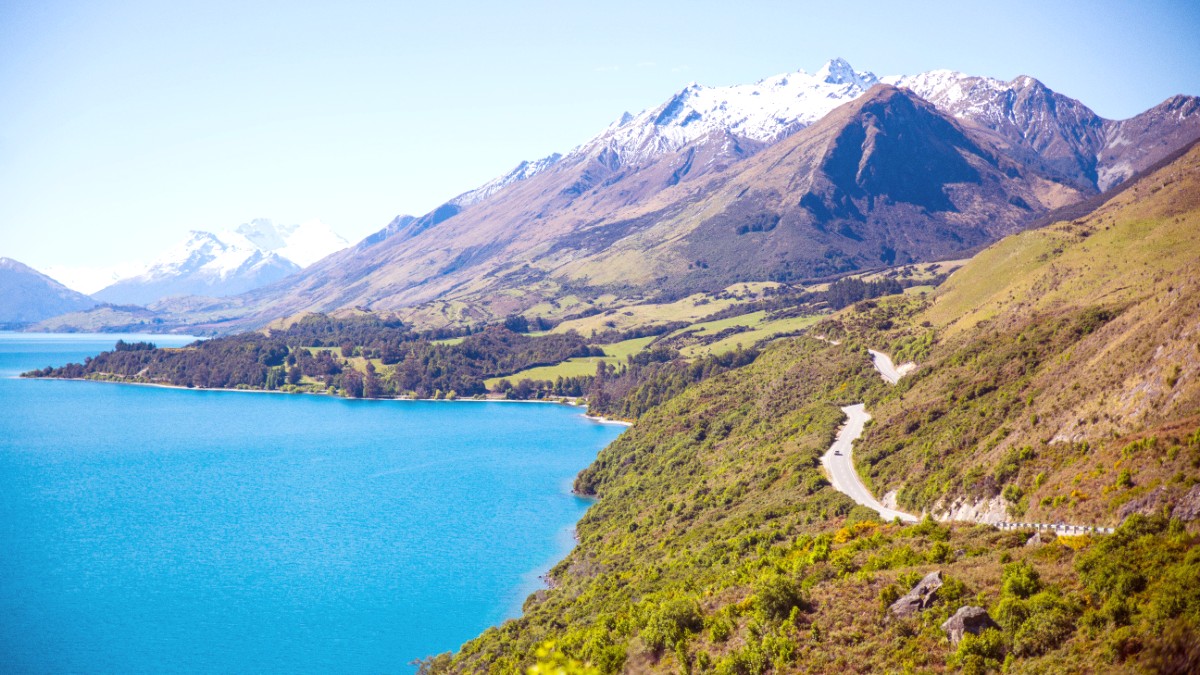
Queenstown And Wanaka, New Zealand
Each season offers a different atmosphere and set of activities.
Climate Patterns Throughout the Year: Summer (December - February) are the warmest months, with average daytime temperatures ranging from 20°C to 30°C (68°F to 86°F). Autumn (March - May) brings mild temperatures, typically between 10°C and 20°C (50°F to 68°F).
The weather in an alpine environment can change rapidly. Always prepare for four seasons in one day, notably in spring and autumn. Carry layers and a Waterproof jacket.
In winter (June-September), snow and ice are common. Roads to ski fields and some mountain passes may need Snow chains. New Zealand has a strong sun due to less atmospheric protection. Sun protection is critical. Use High-SPF sunscreen, wear a Wide-brimmed hat, Sunglasses, and protective clothing. Reapply sunscreen frequently.
High UV Index
Use Broad-spectrum SPF 50+ sunscreen. Reapply often.
Sun is strong even on cloudy days. Wear a hat, sunglasses, and protective clothing.
Rapid Changes
Carry layers and a waterproof jacket. Check forecasts before outdoor activities.
Hypothermia, whiteouts, and flash floods are risks in mountainous areas.
Snow & Ice
Roads to ski fields may need snow chains. Rental companies can provide these.
Always check NZTA road conditions before driving in winter.
Skiing & Snowboarding: June to early October, with peak conditions in July-August. Hiking & Tramping: November to April, for warmer temperatures and longer daylight hours. Water Sports (Jet Boating, White Water Rafting): December to March, for warmer water and air.
Bungy Jumping & Skydiving: Year-round, but weather can cause cancellations. Operators will rebook or refund. Wine Tasting: Year-round. Autumn is harvest season, offering a chance to see winemaking in action.
Align your visit with your main activity interests for the best experience.
If skiing is a priority, choose winter for peak conditions and lively scenes.
For hiking and water sports, summer or the shoulder seasons are a better choice.
Shoulder seasons often mean lower prices and fewer crowds.
Always check weather forecasts, especially for outdoor activities, as conditions can change rapidly.
New Zealand has clear entry requirements for visitors.
Ensure you apply for the correct visa type based on your nationality and purpose of visit. Processing times vary, so apply well in advance.
Gather all necessary documents to avoid issues at immigration. Keep copies of everything for safety.
Queenstown can be an expensive destination, but you tailor your budget to your travel style.
New Zealand is a safe country, but awareness and preparation are always beneficial.
Sunburn: New Zealand has a very high UV index. The sun is strong, even on cloudy days. Use high-SPF sunscreen (SPF 50+ is recommended), wear a wide-brimmed hat, sunglasses, and protective clothing.
Sandflies: These tiny biting insects are prevalent in damp, bushy areas, specifically near lakes and rivers. Bites are itchy but generally harmless. Use Insect repellent containing DEET or picaridin. Consider a specialized Sandfly repellent for effective protection.
For Police, Fire, or Ambulance, dial 111 from any phone. This call is free. Clearly state which service you need. For non-urgent police matters, dial 105.
Healthcare: New Zealand has a high standard of public and private healthcare.
Visitors are generally not eligible for free public health services, except in emergencies or if a reciprocal health agreement applies.
Queenstown Lakes Hospital provides emergency and general medical services. It is located at 20 Frankton Road. Several general practices (GPs) and urgent care clinics are available, like Queenstown Medical Centre.
Drinking Water: Tap water is safe to drink throughout Queenstown and New Zealand.
Medical treatment can be expensive without travel insurance. Ensure your policy covers adventure activities.
New Zealand has a low crime rate, and Queenstown is generally considered very safe for tourists. Petty theft can occur. Take standard precautions: secure valuables, do not leave bags unattended.
Most areas are safe for walking, even at night. Use common sense, especially in nightlife areas.
Petty theft from unlocked cars or unattended bags can occur. Secure valuables.
| Category | Recommendation | Details |
|---|---|---|
| Travel Insurance | Highly Recommended | Covers medical emergencies, evacuation, cancellation, luggage loss, adventure activities. |
| Medical Assistance | Queenstown Lakes Hospital | Phone: +64 3-441 0010. For general medical advice, call Healthline (0800 611 116). |
| Lost Passport | Contact Embassy | Contact your country's embassy or consulate in New Zealand (Wellington or Auckland). |